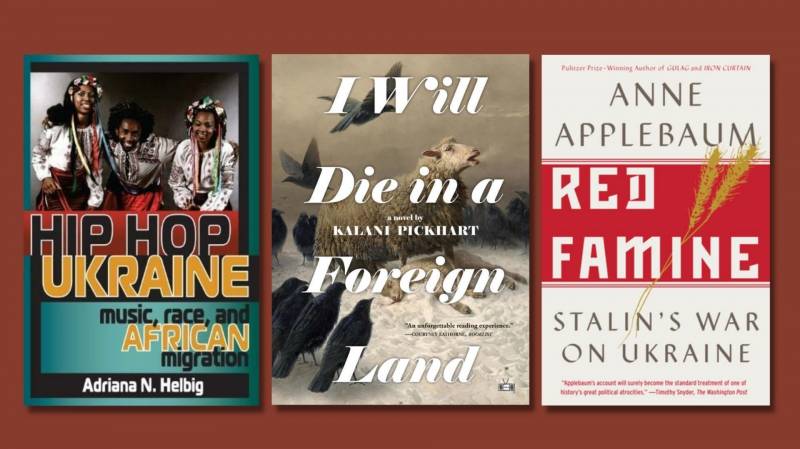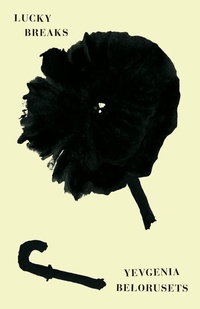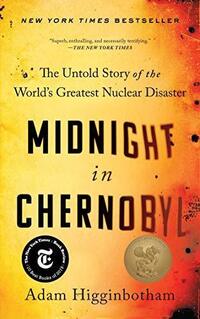At Kramers, an independent bookstore in Washington, D.C., a lot of books about Russia and Ukraine are sold out. The books started going off the shelves a little more than a week ago as the world braced for a Russian invasion of Ukraine, general manager Llalan Fowler said.
Read These 6 Books About Ukraine

“People have definitely been picking up the Russian books more, like Putin’s People and that sort of title,” she told NPR. “A lot of the books that are available to us about Ukraine and Russia and their relationship and their history are out of stock already at our supplier.”
Many customers come into the shop knowing what they want, she said. But if you’re not sure what to reach for first, here’s a roundup of books about Ukraine that you might want to dive into.
I Will Die in a Foreign Land, by Kalani Pickhart
Pickhart’s debut novel is on Fowler’s to-read list. Named among the New York Public Library’s best books of 2021, I Will Die in a Foreign Land chronicles what Ukrainian protests looked like in 2013 and 2014, as demonstrators pushed for closer ties with NATO and the European Union.
Pickhart told KJZZ‘s The Show last month that the book has garnered more attention as tensions grew between Russia and Ukraine.
“I think a lot of folks are looking for more information and to sort of understand the conflict in a way that’s sort of digestible, essentially just trying to get a sense of the emotional movement of what’s going on,” Pickhart said.

Lucky Breaks, by Yevgenia Belorusets
A fiction book on Fowler’s list, Lucky Breaks, translated from Russian by Eugene Ostashevsky, is a collection of short stories about women living in the aftermath of war in Ukraine. Belorusets, a Ukrainian writer, centers on ordinary lives—a florist, a cosmetologist, a card player, among others.
Hip Hop Ukraine: Music, Race, and African Migration, by Adriana Helbig
Helbig, who chairs the University of Pittsburgh’s music department, saw African musicians rapping in Ukrainian during the Orange Revolution in 2004. The revolution followed a presidential election, which many claimed to be corrupt and fraudulent.
Through ethnographic research of music, media and policy, Helbig’s book delves into the world of urban music, hip hop parties and dance competitions, along with interracial encounters among African immigrants and the local population.

Midnight in Chernobyl, by Adam Higginbotham
Higginbotham, a journalist, spent years investigating the aftermath of the Chernobyl nuclear disaster. In his book, he digs into the design flaws and Soviet secrecy that contributed to the explosion, as well as the efforts to contain the damage. He spoke to Fresh Air about the novel in 2019.
Jews and Ukrainians in Russia’s Literary Borderlands: From the Shtetl Fair to the Petersburg Bookshop, by Amelia Glaser
This book, which covers much of the 19th century and part of the 20th century in Ukraine, explores how those working and writing in Russian, Ukrainian and Yiddish communicated and collaborated at places like commercial markets and fairs. Glaser’s study seeks to show that Eastern European literature was much more than just a single language and culture.
Red Famine: Stalin’s War on Ukraine, by Anne Applebaum
This book delves into the famine in Ukraine created by Joseph Stalin in the early 1930s, as he sought to destroy the Ukrainian national movement. Nearly 4 million Ukrainians died and many were arrested by Soviet secret police.
On NPR’s Fresh Air, Applebaum, a historian and journalist writing about the war in Ukraine for The Atlantic, explained how Vladimir Putin and Stalin saw Ukraine similarly: “as a vector for ideas that could undermine him or threaten him.”
9(MDAxOTAwOTE4MDEyMTkxMDAzNjczZDljZA004))

